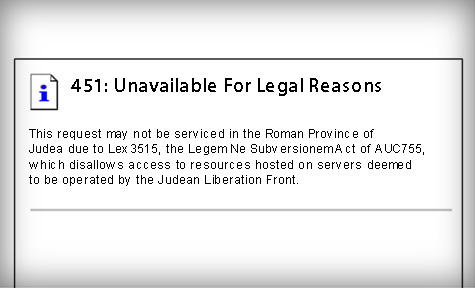Search News

This is the proposed dummy text for "Status Code 451," a suggested error message for censored sites.
NEW YORK (CNNMoney) -- If a website you're trying to reach is blocked for legal reasons, do you have a right to know about it?
Developer advocate Tim Bray thinks so, and he's got a perfect error code for it: 451, a tribute to the late Ray Bradbury's landmark novel about censorship, Fahrenheit 451.
Bray, a self-described "general-purpose Web geek" who helped develop several key Internet standards, wrote a formal specification for his proposal and submitted it to the Internet Engineering Task Force (IETF), the body that develops and promotes Internet standards. The group is slated to take up Bray's proposal at next week's annual meeting, which begins Sunday in Vancouver, Canada.
"I've been told by the chair of the IETF HTTP Working Group that he'll give the proposal some agenda time at the next IETF meeting," Bray told CNNMoney by email. "It's not a big proposal; shouldn't take long."
Most internet users are familiar with "404 Not Found" errors, the HTTP status messages that come up when you click on a broken or dead link. Another common error, "403 Forbidden," is displayed when you try to reach a site whose server won't grant you access to it.
That's the error code U.K. blogger Terence Eden hit when he tried to reach The Pirate Bay, a notorious hub for pirated content that is frequently targeted in lawsuits. Eden's Internet provider had been ordered to block out the site, but Eden wasn't happy with the 403 error response it generated.
"As far as I am concerned, this response is factually incorrect," Eden wrote on his blog.
He points out that it wasn't Pirate Bay's server that refused to allow him access. "The server did not even see the request. It was intercepted by my ISP and rejected by them on legal grounds," he wrote.
Eden called for a new "HTTP code for censorship" -- a call Bray answered with literary flair.
The idea quickly caught on, sparking discussions on nerd-news gathering spots like Slashdot and Hacker News. Commenters kicked it around in Spanish on meneame, in Russian on habrahabr and in German on NetzPolitik. One Slashdotter commenter called the idea "so painfully obvious."
If the proposal gets the official nod -- what Bray calls "the famous IETF 'rough consensus' level of approval" -- the spec would be revised and eventually published. Then it would be up to browser makers and website operators to implement it.
"There'd be remarkably little engineering required on the server side," Bray said. "My bet is that should this go forward, most servers would provide explanatory text with a 451."
Bray's proposal suggests that the 451 "Unavailable For Legal Reasons" status return details on the restriction and what legal authority is imposing it. The code would remain optional -- and Bray acknowledged that its use could be controversial.
"In my idealistic moments, I hope that the likelihood of being so identified might encourage certain parties to think twice about seeking to block parts of the Web," he said. "I think most people agree that censorship is sometimes justified, but it's just common sense that when it happens, it should happen out in the open." ![]()